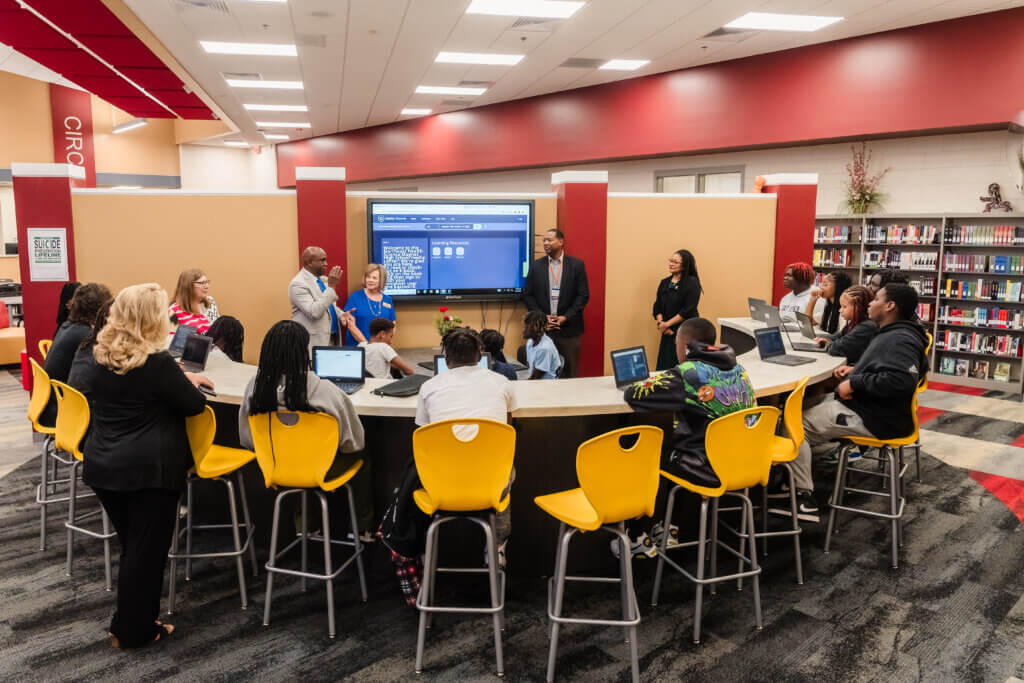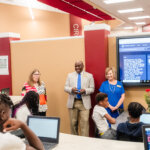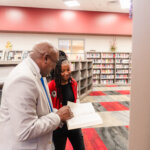by Dr. Lisa Mayfield Spence
photos by Mike Young
Macon-Bibb leaders ally to improve literacy for all
Literacy is a bridge from misery to hope. It is a tool for daily life in modern society. It is a bulwark against poverty and a building block of development, an essential complement to investments in roads, dams, clinics, and factories.
Literacy is a platform for democratization, and a vehicle for the promotion of cultural and national identity. Especially for girls and women, it is an agent of family health and nutrition. For everyone, everywhere, literacy is, along with education in general, a basic human right.
Literacy is, finally, the road to human progress and the means through which every man, woman and child can realize his or her full potential. These aspirations merit our strongest possible support.
–The message of UNESCO Secretary-General Kofi Annan on the occasion of the tenth annual International Literacy Day, September 8, 1977.
Literacy is more than reading and writing
The idea of literacy sounds straightforward – being able to read and write – but the word denotes a complex skill set, and it isn’t all or nothing, literate or illiterate. There is a spectrum of knowledge and ability – of reading and writing well, and applying that comprehension – and the goal is to increase entire communities’ literacy levels as much as possible.
The National Center for Education Statistics (NCES), an arm of the U.S. Department of Education that produces literacy data our leaders use to make policy decisions, defines literacy as “understanding, evaluating, using and engaging with written texts to participate in society, to achieve one’s goals, and to develop one’s knowledge and potential.” Buzzwords like “financial literacy” and “digital literacy” are now in common parlance, expanding the idea further. At its core, the idea of literacy is the ability to access, make sense of, and meaningfully use information. Most of all, as Secretary-General Annan said above, “Literacy is … a basic human right.”
Allying to improve literacy
The more literacy a community achieves, the more children can succeed in school and life; the more parents can support their families by gaining stable careers, supporting their children’s learning; and the more all citizens can make more informed decisions about healthcare, finances, and voting, and engage more deeply with all that enriches their life through lifelong learning on all topics.
Mayor Miller suggested that for Macon-Bibb to ensure it is helping everyone to be successful, it must better understand the people’s needs, the available resources, and the gaps that currently exist.
As the mayor’s 2021 Literacy Month Proclamation indicates, approximately one in eight Americans cannot read or write above a third-grade level. Half of U.S. adults cannot read a book written at the eighth-grade level, according to The Washington Post. Low literacy is a nationwide issue, and Georgia ranks 42nd of the 50 states, according NCES data. The Literacy Month Proclamation continues, “In Georgia alone, roughly 1 million individuals over the age of eighteen have not completed high school or received a High School Equivalency Credential.” Dr. Ivan H. Allen, President of Central Georgia Technical College, reported that of those 1 million Georgians, 15,600 are Macon-Bibb residents.
Jennifer Lautzenheiser, director of Middle Georgia Regional Libraries, put these abstract milestones in more concrete terms: “Our PIAAC literacy score in Bibb County is 250 out of 500. This means that the average reader has enough literacy to read reviews on a website and decide whether they would like to buy the product. Only 39% of our adult population has the ability to read a dense text, disregard irrelevant information, and evaluate for meaning. This means reading a user agreement, a ballot item, or even an in-depth news article is beyond the abilities of 61% of our adult population. Even more concerning is that according to this data set, 30% of Bibb County adults have only enough literacy skills to fill out a form or scroll through memes on social media. It’s a big ask to have an adult who is struggling themselves to teach their child to read. And thus, we have a cycle.”
Bibb County childhood literacy rates are slightly below average for the state, according to the NCES, and a July 2023 study by the Georgia Department of Education shows that one-third of all third-grade students in Georgia can’t read at grade level or above. COVID-19 learning loss factors into the issue, as well: by small margins, fourth-grade reading levels are as low as they have been since 2005, and eighth-grade reading levels are as low as they have been since 1998, according to the NCES-published 2022 Nation’s Report Card.
In the coming years, following the learning loss set forth during the COVID-19 pandemic and economic downturns, there is a critical need to revamp and retool the network for sustainable literacy gains, according to MLA Executive Director Jim Montgomery. The average American student would need 4.1 additional months of schooling to catch up from COVID-related learning loss, according to the NWEA’s Center for School and Student Progress, with substantial achievement gaps lingering after the 2022-2023 school year. “There is a literacy deficit within the educational pipeline for students and adult learners,” Montgomery concluded. The MLA hopes to help close that gap in Macon-Bibb.
In short, Macon-Bibb isn’t alone in having less-than-ideal literacy rates. Macon-Bibb wants to be a part of the solution, enacting grassroots change to make things better, right where we are.
Partners in the MLA
Fully engaged and deeply committed to their purpose, several entities partnered in September 2022 to launch MLA, including Macon-Bibb County, Central Georgia Technical College, Bibb County School District, The Knight Foundation, Macon Magazine, Midsouth Community Federal Credit Union, Macon Housing Authority, Bibb Community Partnerships, and Keep Macon-Bibb Beautiful. Partners and affiliates total about 25 entities, including Bibb County Government divisions, the Department of Juvenile Justice, Middle Georgia Regional Library, and United Way of Central Georgia. “This collaborative effort is allowing us the chance to better identify the literacy needs, set targets, and plan our steps to improve literacy for both children and adults,” said Montgomery.
Goals of the MLA
One of the early goals of the Alliance was to establish an organizational vision to increase the graduation rate, decrease the drop-out rate, and lower the adult illiteracy rate by 50% over 10 years. Its pivotal focus of guiding a two-generational approach toward impacting literacy is critical to addressing specific needs, allowing the Alliance to achieve Georgia Certified Literate Community Program status. MLA seeks to create a realistic two-generational pipeline that includes children from early childhood through collegiate level, English language learners, and adult learners.
“We are working on five types of literacy. Family literacy, digital literacy, environmental literacy, re-entry, and workforce development,” Montgomery continued, stressing the importance of literacy as a complex skill that extends to “all the literacies pertinent to living a quality life.”
Childhood literacy efforts
Bibb County School District
Dr. Cleveland Johnson, Assistant Superintendent of Teaching and Learning for the Bibb County School District (BCSD), added that community leaders are working hard to provide support to increase literacy through important collaborations and partnerships. The district is working both within its organization and outside in the community to help promote positive change, he said.
For instance, BCSD is training all its elementary teachers and administrators in instruction methods aligned with the Science of Reading, an approach based on decades of research in fields including neuroscience that point to effective strategies for teaching children to read.
“The district also provides ongoing professional development to teachers in literacy instruction throughout the school year,” explained Johnson. At the same time, BCSD works continuously to review current learning standards, supporting resources, and instructional programs that support literacy for K-12 students, he said.
Appleton Free to Read
BCSD partners with local entities interested in literacy improvements. Among those is Appleton Free to Read, which stems from a Children’s Defense Fund Freedom School program held in Macon during the summers from 2017 to 2019. In 2020, during the pandemic, “we shifted to develop our own unique program,” said Julie Groce, Appleton Episcopal Ministries Missioner and director of the literacy program. The free onsite program runs for several weeks each summer and serves up to 50 rising first through third graders. This limited enrollment allows small classes and personal interaction with every child.
Each day begins with a ReadAloud Guest, followed by breakouts into classrooms to read a new book and complete interdisciplinary activities. The program evaluates student reading capacity at pre- and post-program levels and has added a reading specialist to provide further personalized instruction. “We analyze each summer’s program before developing the following year’s curriculum and work closely with Bibb County’s school reading specialists and family engagement personnel to identify children who can best benefit from our program,” Groce explained.
Groce maintains a relationship with each of the program’s Bibb County target schools; she also maintains contact with the students’ families throughout the school year and encourages children to attend local tutoring for continued academic progress. The Free to Read program relies on diverse local funding, including Episcopal and other church denominations, civic groups, private foundations, and individual donors. This summer, the program received a grant from the Community Foundation of Central Georgia’s Macon Violence Prevention Fund, acknowledging its efforts to provide a safe space for children to increase their literacy skills, avoid food insecurity, and increase their capacity for interpersonal skills and emotional development, according to Groce.
Middle Georgia Regional Library and Read United
The Middle Georgia Regional Library also partners with BCSD to promote literacy-related library events, according to Johnson. “BCSD students have access to the student PLAYcard program,” he explained. “The PINES Library Card Access for Youth (PLAY) program gives students free access to public library materials and online resources to help them succeed in school.”
“The district also partners with the United Way to provide support in the area of student literacy in several ways,” added Michelle Lenderman, Director of Media Services for BCSD. Through the United Way’s volunteer tutor program, Read United, BCSD students are able to brush up on reading skills, for example.
“Read United is the United Way of Central Georgia’s grade-level reading initiative,” explained Dr. Sherri Dennis-Flagg, Read United Program Manager. The United Way partners with the AARP (American Association of Retired Persons) Experience Corps to provide reading support for struggling readers through volunteer tutors, she said. The Read United program operates in six school districts across Central Georgia, collaborating with schools, educators, and community organizations, Dennis-Flagg explained.
Read United’s overarching goal is to reinforce the school district’s strategic priorities to improve grade-level reading and increase graduation rates. “Our partnerships allow us to ensure our staff and volunteers receive ongoing research-based and evidence-proven training and support,” Dennis-Flagg explained. Volunteers come from all sectors of the community: 50+ aged individuals and college students; business, civic, and faith-based groups; and working professionals and parents cooperating to address school readiness and grade-level reading, she said. “They all understand the importance of investing in the future of our children,” Dennis-Flagg added.
The United Way of Central Georgia also launched Laundromat Library earlier this year, funded through a grant from The Community Foundation of Central Georgia and partnering with volunteers of Zeta Amicae of Macon, to manage “book nooks” at various business locations throughout Bibb County.
Jennifer Lautzenheiser, Director of Libraries for the Middle Georgia Regional Library (MGRL) explained how MGRL works on multiple layers of literacy. “We start with Children’s Storytimes, which focus on exposing children to early language skills, and our 1,000 Books Before Kindergarten program, which promotes the development of vocabulary and written word exposure to prepare children to be successful and on level with their peers when they start school,” she said.
School-age kids participate in activities that build upon their early literacy skills to promote problem solving, research, and love of reading, Lautzenheiser continued. “These include STEM programs, book clubs, teen lounges, anime activities, and more,” she said. This is the age that benefits most from the Summer Reading Program, too, she explained. “The annual program includes onsite activities such as animal programs with the Museum of Arts and Sciences,” she said. Self-selection of reading materials helps to increase reading fluency and comprehension because kids enjoy the content, she explained.
Adult literacy efforts
Central Georgia Technical College (CGTC) has long been at the forefront of adult learning in our region for decades. Dr. Wanda West, CGTC’s Special Projects Director, and Mrs. Brenda Brown, CGTC’s Vice President for Adult Education, were the first to conceive of the idea of the MLA as a part of their work in creating a Certified Literate Community Program in Macon-Bibb. They remain key players in these efforts.
Brown noted, “Through partnerships, the two-generation approach allows us to provide adult education services to parents who in turn are better equipped to teach their own children. It has been said that parents are a child’s first and best teacher. The impact extends beyond one’s family, to extended family, church family, and the community.”
CGTC’s adult education programming focuses on connecting individuals to the economic engine, providing the opportunities they need to gain the skills required for household management, job training, and – the goal – a fulfilling career. They welcome all adults to enroll in their continued learning programs, and especially those 15,600 Macon-Bibb residents who do not have a high school diploma or its equivalent.
There’s also a renewed focus on adult literacy at the Middle Georgia Regional Library, Lautzenheiser explained. “We’ve always supported two-generational literacy efforts with our entire family programming, but we’ve hired an Adult Literacy Librarian, Rebekah Scarborough-McGraw, who focuses solely on the literacy needs of the adults in our community. She can help people locate materials to improve their reading skills and comprehension. She can also connect individuals to appropriate resources and programs for their needs.”
“We are grateful for our many community partners and the way we all work cooperatively to meet the resources to the need,” Lautzenheiser added. As a community, she said, “We need to stay the course. We have strong partnerships which are seeing success and proven initiatives making a true impact,” she continued. “Every small step is a ripple to our greater community, moving us all toward success.”
Community leaders must continue to work together in support of improved literacy rates, added Dr. Cleveland Johnson of the BCSD. “We must engage all stakeholders in the development and execution of plans that highlight the importance of literacy to the vitality of our community,” he said.
Find more information about volunteering or donating:
-
- Read United: https://www.unitedwaycg.org/ReadUnited
- Appleton Episcopal Ministries’ Free to Read: https://www.appletonepiscopal.org/contact–donate.html
- To support CGTC’s adult literacy programs: contact Community Outreach Coordinator Daron Lee at dlee@centralgatech.edu or (478) 757-4353.
To sign up for a PLAYcard: visit your local Middle Georgia Regional Library or https://bibblib.org/services/youth/student_play_card.php
For support with adult literacy:
-
- Contact the Reference Desk at Washington Memorial Library by calling 478-310-2153 to schedule an appointment with their Adult Literacy Librarian.
- Find a program for adult learners through CGTC at https://www.centralgatech.edu/adult-education.




